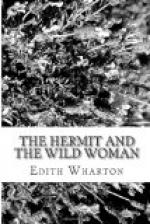For a long time she had not been able to pass by the bench under the willows—she even avoided the elm walk till autumn had stripped its branches. But every day, now, she noted a step toward recovery; and at last a day came when, walking along the river, she said to herself, as she approached the bench: “I used not to be able to pass here without thinking of him; and now I am not thinking of him at all!”
This seemed such convincing proof of her recovery that she began, as spring returned, to permit herself, now and then, a quiet session on the bench—a dedicated hour from which she went back fortified to her task.
She had not heard from her friend for six weeks or more—the intervals between his letters were growing longer. But that was “best” too, and she was not anxious, for she knew he had obtained the post he had been preparing for, and that his active life in London had begun. The thought reminded her, one mild March day, that in leaving the house she had thrust in her reticule a letter from a Wentworth friend who was abroad on a holiday. The envelope bore the London post mark, a fact showing that the lady’s face was turned toward home. Margaret seated herself on her bench, and drawing out the letter began to read it.
The London described was that of shops and museums—as remote as possible from the setting of Guy Dawnish’s existence. But suddenly Margaret’s eye fell on his name, and the page began to tremble in her hands.
“I heard such a funny thing yesterday about your friend Mr. Dawnish. We went to a tea at Professor Bunce’s (I do wish you knew the Bunces—their atmosphere is so uplifting), and there I met that Miss Bruce-Pringle who came out last year to take a course in histology at the Annex. Of course she asked about you and Mr. Ransom, and then she told me she had just seen Mr. Dawnish’s aunt—the clever one he was always talking about, Lady Caroline something—and that they were all in a dreadful state about him. I wonder if you knew he was engaged when he went to America? He never mentioned it to us. She said it was not a positive engagement, but an understanding with a girl he has always been devoted to, who lives near their place in Wiltshire; and both families expected the marriage to take place as soon as he got back. It seems the girl is an heiress (you know how low the English ideals are compared with ours), and Miss Bruce-Pringle said his relations were perfectly delighted at his ‘being provided for,’ as she called it. Well, when he got back he asked the girl to release him; and she and her family were furious, and so were his people; but he holds out, and won’t marry her, and won’t give a reason, except that he has ’formed an unfortunate attachment.’ Did you ever hear anything so peculiar? His aunt, who is quite wild about it, says it must have happened at Wentworth, because he didn’t go anywhere else in America. Do you suppose it could have been the Brant girl? But why ‘unfortunate’ when everybody knows she would have jumped at him?”




